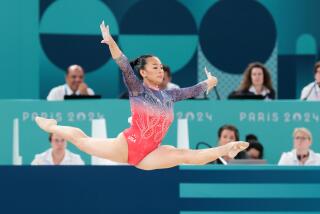Review: In her novel ‘The Expatriates’, Janice Y.K. Lee explores contemporary lives in Hong Kong
A Hong Kong native of Korean descent who now lives in New York, Janice Y.K. Lee set her debut novel, “The Piano Teacher,” in the then-British colony in the 1940s and ‘50s. She deftly refracted events of the time through the personal stories of English and Eurasian expats and their devastating relationships with Japanese occupiers and, later, Chinese Hong Kong natives. In her second novel, “The Expatriates,” Lee again turns her power of observation on uprooted lives and how they converge and intersect within Hong Kong — this time in the present day.
As modern Hong Kong teems with locals and expatriates arriving daily from New York, London, Jakarta and Tokyo, the novel’s primary focus is on three women who live within the isolated, mostly American sector of the former British colony. The women’s lives are distant, but their troubles are relatable; this is popular fiction with an international lens.
Mercy Cho, a recent graduate of Columbia, arrived in Hong Kong on her own at 23 in the hopes of finding a job. Margaret Reade abandoned a landscape design practice in California to become the “trailing spouse” of husband Clarke, whose work as a senior executive with a U.S. multinational uprooted her and their children to a home in an exclusive Southside suburb. Hilary Starr, 38, has lived in the same “particularly homogeneous enclave of expatdom” with her attorney husband, David, for 10 years. Unable to conceive, Hilary is “test driving” an older mixed-race child who is invited from a local group home for weekly piano lessons and snacks.
Despite living in a now-Chinese territory of 7 million, residents of the American section of Hong Kong are thoroughly isolated, cosseted by the outsize perks of their expat lives, which lets them feel entitled to “be louder, demand more, because they were somehow above — really better than — the locals.” It’s a community where everyone knows one another, bound together by white privilege or attempts to attain it.
Mercy, the Queens-born daughter of an unsuccessful Korean businessman, has always been acutely aware of the racial and class divides among her friends and has been unable, post-graduation, to leverage her contacts into a meaningful job. The move to Hong Kong was supposed to change her luck, so when Mercy meets Margaret at a birthday party for a Korean Columbia alum married to an American, it seems to be coming true. Does Margaret, mixed-race Korean herself, sense a kinship with Mercy or does she just want a younger American to entertain and care for her three children? Regardless, Mercy is grateful for the attention — and the money she’s paid for being a nanny — until she accompanies the family on a fateful vacation to Korea. Afterward, Mercy lives in guilty, near-anorexic isolation on the outskirts of the Central district while Margaret is so unhinged that she rents and begins to visit a secret apartment, trying to find solace amid tragedy.
Hilary’s life, with its ladies lunches and volunteer efforts at the library, seems placid by comparison. Yet underneath her perfectly styled wardrobe, visits with her potential child and distant yet cordial relationship with husband David, there is a longing for sensation and connection. “Those moments are there in her past, glimmering like small flames in the far, far dark of her memories. Maybe she has to go back to go forward to get there again.” And courtesy of a surprising act by David, Hilary will do that and much more.
One chief pleasure of “The Expatriates” is watching how the lives of Hilary, Mercy and Margaret converge and are changed by that convergence, and how they each metabolize grief.
A more subtle yet lingering benefit is getting to know Lee’s acutely observed Hong Kong, a city on the cusp of change that must eventually affect the lives of expatriates and locals alike: “Is it any wonder, she thinks, that expats become like spoiled rich children, coddled and made to feel as if their every whim should be gratified?... The locals are the feudal servants, running to obey every whim. These small empires, these carefully tended paradises of sand and palm, shelter the expatriates from the brutal realities just outside the guarded gates.”
Although separated by decades, “The Expatriates” continues themes Lee first explored in “The Piano Teacher,” creating a fictional continuum in the changing city of Hong Kong and the people who are forced by circumstance and geography to change with it.
::
The Expatriates
Janice Y.K. Lee
Viking: 336 pp., $27
Woods is the editor of several anthologies and four novels in the Charlotte Justice mystery series.
More to Read
Sign up for our Book Club newsletter
Get the latest news, events and more from the Los Angeles Times Book Club, and help us get L.A. reading and talking.
You may occasionally receive promotional content from the Los Angeles Times.








